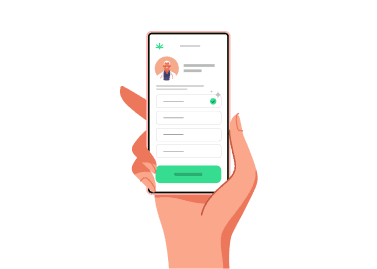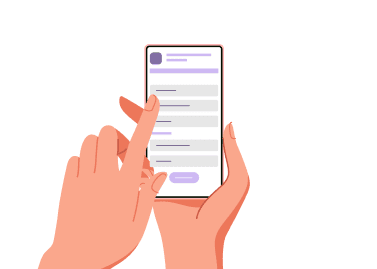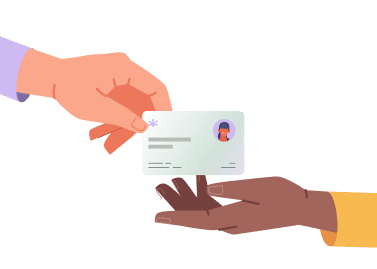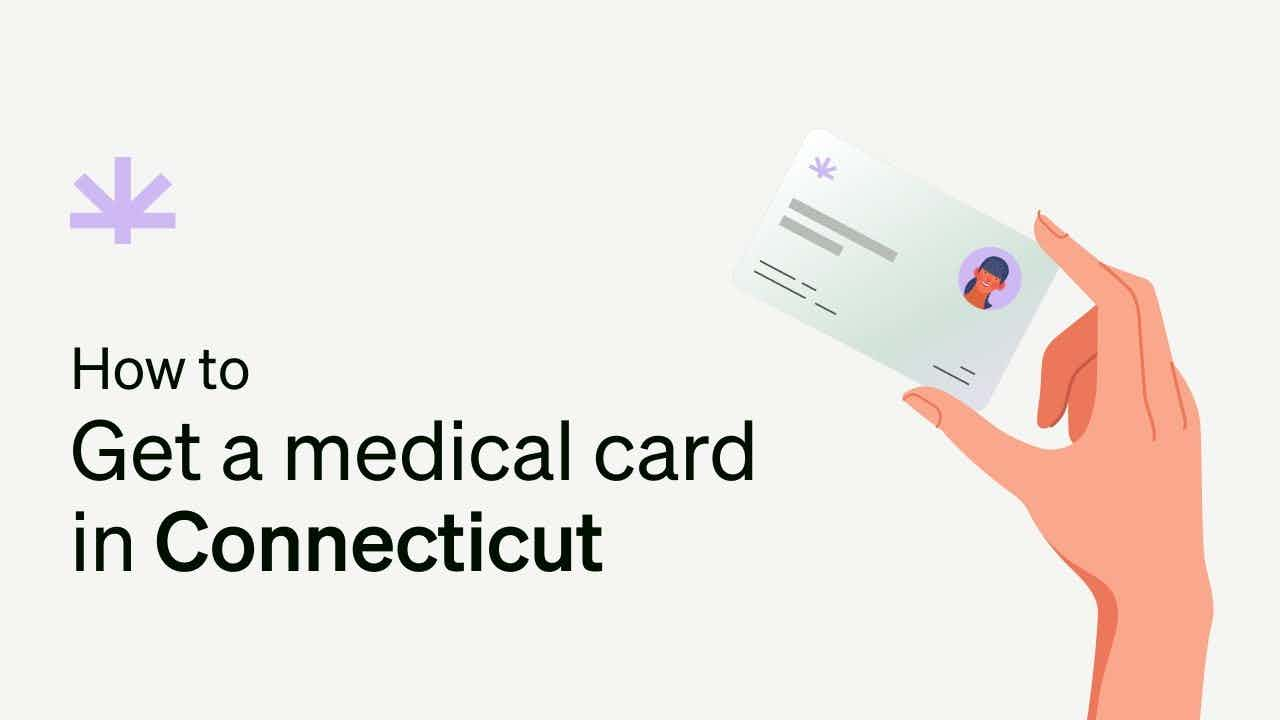Best Care, Best Value
Get Your Connecticut Medical Marijuana Card.
Only $149.
Quick and Easy Process
Get Approved or Your Money Back
Already a Leafwell patient?
Log in here
Trusted by 400,000+ Patients
Best Care, Best Value
We are the #1 medical card certification platform with the best value in your state.
4.9 out of 5 stars
Patient support and satisfaction are at the heart of everything we do.
Be seen in under 10 mins
Our healthcare providers are available to see you from 8 a.m. to 8 p.m. 7 days a week.
Get approved in minutes.
It’s quick, easy, and convenient.
How getting a CT medical marijuana card works for Connecticut residents.
- Step 1

Sign Up
No appointment necessary. Book a medical marijuana consultation and undergo an evaluation with a Connecticut-licensed medical marijuana doctor. It’s quick and easy!
- Step 2

Meet Your Provider
Talk to your medical marijuana doctor about medical cannabis in relation to your healthcare needs. This consultation fee is $149 for an examination.
- Step 3

Get Certified and Complete Your Application
Complete the application by creating a DAS Business Network account and accessing the online certification system. There’s no state registration fee.
- Step 4

Get Your Card From the State of Connecticut
Once approved, the state will email you a temporary card, which is valid for up to 60 days. A physical copy of your card is sent to the address provided on your application form between seven and 31 days.
Have Questions?
See a detailed step-by-step explainer on how to apply for your CT medical marijuana card.
Benefits of Getting a Medical Marijuana Card
Wondering how a CT medical marijuana card can transform your medical cannabis experience?
State-Specific Steps
Embarking on your journey to relief in CT is simple. Let our caring specialists guide you through the state-specific steps if you're a Connecticut resident looking to get a med card.
- Book An Appointment with a Leafwell Marijuana Doctor
- Get Your Medical Marijuana Certification
- Complete Your State Application
- Get Your Medical Marijuana Card From the State

Watch this video on how to get a medical card in Connecticut
Best Care, Best Value
Retail price as of 04/12/2024
What You Pay with Leafwell
Connecticut medical marijuana patients save more with Leafwell. Get your money back if not approved.
Qualifying Medical Conditions
The following conditions may qualify you for a CT medical marijuana certificate and card:
- Addiction Treatment
- Amyotrophic Lateral Sclerosis (ALS)
- Cachexia
- Cancer
- Cerebral Palsy (CP)
- Chronic Neuropathic Pain Associated with Degenerative Spinal Disorders
- Chronic Pain
- Chronic Pancreatitis
- Complex Regional Pain Syndrome, Type 1 and Type II
- Crohn’s Disease
- Cystic Fibrosis
- Damage to the Nervous Tissue of the Spinal Cord with Objective Neurological Indication of Intractable Spasticity
- Ehlers-Danlos Syndrome Associated with Chronic Pain
- Epilepsy
- Glaucoma
- Hydrocephalus with Intractable Headache
- Interstitial Cystitis
- Intractable Headache Syndromes
- Intractable Neuropathic Pain that Is Unresponsive to Standard Medical Treatments
- Irreversible Spinal Cord Injury with Objective Neurological Indication of Intractable Spasticity
- Median Arcuate Ligament Syndrome (MALS Syndrome)
- Movement disorders associated with Huntington’s Disease
- Multiple Sclerosis (MS)
- Muscular Dystrophy
- Neuropathic Facial Pain
- Osteogenesis Imperfecta
- Parkinson’s Disease
- Positive Status for Human Immunodeficiency Virus or Acquired Immune Deficiency Syndrome (HIV/AIDS)
- Post Herpetic Neuralgia
- Post Laminectomy Syndrome with Chronic Radiculopathy
- Post-Traumatic Stress Disorder (PTSD)
- Severe Psoriasis and Psoriatic Arthritis
- Severe Rheumatoid Arthritis
- Sickle Cell Disease
- Spasticity or Neuropathic Pain Associated with Fibromyalgia
- Terminal Illness Requiring End-of-life Care
- Tourette Syndrome
- Ulcerative Colitis
- Uncontrolled Intractable Seizure Disorder
- Vulvodynia and Vulvar Burning
- Wasting Syndrome
For medical cannabis patients who are minors, the list of qualifying debilitating medical conditions is less expansive. These are the recognized medical conditions for minors in Connecticut:
- Cerebral Palsy
- Chronic Pancreatitis for patients whose pain is recalcitrant to standard medical management
- Cystic Fibrosis
- Intractable Neuropathic Pain that Is Unresponsive to Standard Medical Treatments
- Irreversible Spinal Cord Injury with Objective Neurological Indication of Intractable Spasticity
- Muscular Dystrophy
- Osteogenesis Imperfecta
- Severe Epilepsy
- Terminal Illness Requiring End-of-life Care
- Tourette Syndrome for patients who have failed standard medical treatment
- Uncontrolled Intractable Seizure Disorder
Convenient, Quality Care When You Need It Most
With Leafwell, you'll be matched up with a highly knowledgeable, empathetic, licensed medical marijuana doctor or provider.

What You Need to Know
Apply NowEligibility / Patient
Patients must be 18 years old or older and a Connecticut resident to qualify for a medical marijuana card.
Caregiver
Connecticut medical marijuana caregivers must be 18 years old or older. Caregivers must manage the patient’s well-being, have no conviction relating to violating any law regarding the illegal manufacture, sale, or distribution of a controlled substance, and must not be the patient’s doctor.
Can Minors Qualify?
Yes. Minor patients must meet or have telemedicine appointments with two physicians: one, the patient’s primary doctor, and the other, a board-certified specialist in the treatment field for the patient’s qualifying condition. Leafwell can act as the second provider for minors in Connecticut.
One of these physicians will submit a medical marijuana certification to the Department of Consumer Protection (DCP). At the same time, the other must provide the parent or guardian caregiver with a letter confirming that medical cannabis use is in the patient’s best interest. The minor patient’s caregiver will then apply for an MMJ card on behalf of the patient.
What You Need
You’ll need to provide the following to apply for a CT med card:
Medical Records
During your onboarding with Leafwell, you will need to upload medical records supporting your qualifying condition(s).
Medical Marijuana Recommendation
Once approved, your healthcare provider will submit your medical marijuana recommendation to the state so you can complete your application.
Proof of Identity
Patients must submit one legible copy of a non-expired identification form.
The following are acceptable forms of identification: A Connecticut- or out-of-state-issued driver’s license, Connecticut-issued ID, Connecticut pistol or firearm permit, U.S. passport or passport card, permanent resident card, certificate of naturalization, or certificate of citizenship (some age restrictions apply).
Proof of Connecticut Residence
Acceptable proof of residence proves your home address is located in Connecticut and must show your name and your Connecticut residence address, be dated within 90 days, and be computer generated (not typed).
The following documents are acceptable proofs of residence: A computer-generated bill or statement from a bank or mortgage company, utility company, doctor or hospital, a pre-printed pay stub showing both your name and address and your employer’s name and address, first-class mail addressed to your home address, a Medicaid or Medicare benefit statement, a Connecticut voter registration card, and other documents deemed acceptable by the state.
Next Steps After Approval
Congratulations on getting your medical certification! You’re almost there, but there are a few more steps to complete to get your Connecticut medical marijuana card. Let’s dive in!
Before You Start: What You’ll Need
- A valid photo ID
Complete Application: Register or log into the Connecticut Medical Marijuana Program to complete the application. Enter caregiver information (if applicable).
Receive Digital Card: Receive your digital medical card via email within 30 days.
Start Shopping: Legally purchase medical cannabis products from a licensed dispensary.
How to Renew Your Card
The medical marijuana card renewal process is similar to the medical marijuana certificate process for new patients. Here’s what you need to know:
- Sign in to Leafwell or register as a renewal patient here if you’re new to Leafwell.
- Speak to a Connecticut-licensed physician about your qualifying conditions online.
- Get approved, and your doctor will submit your certificate directly to the state.
- Log into the Connecticut Medical Marijuana Program to submit your application.
- Receive your digital medical card via email within 30 days.
Check out our CT medical marijuana card renewal page for more information or to start your renewal application.
Legal Topics
Below, you’ll find important, need-to-know information about Connecticut marijuana law. Please note that holding a medical marijuana card involves restrictions about where you can consume marijuana in Connecticut. The law prohibits ingesting marijuana while:
- In any moving vehicle
- In the workplace.
- On any school, college, or university grounds or property.
- In any public place.
- In the presence of anyone under 18.
Connecticut marijuana law prohibits the palliative use of marijuana that endangers the health or well-being of another person other than the patient or primary caregiver. Selling any amount of marijuana without the appropriate medical marijuana license remains a felony and carries a minimum sentence of seven years in jail and a $25,000 fine.
The law also protects the rights of MMJ cardholders:
- A landlord cannot refuse to rent to someone or take action against a tenant solely because the tenant is qualified to use medical marijuana.
- A school cannot refuse to enroll someone solely because the person is qualified to use medical marijuana.
- An employer cannot decide not to hire someone or fire or otherwise penalize or threaten a person solely because they are qualified to use medical marijuana. However, an employer may prohibit the use of intoxicating substances during work hours and is legally allowed to discipline an employee for being intoxicated while at work.
- Employers cannot discipline or pursue action against an employee for out-of-work cannabis use.
- The odor of cannabis is no longer a valid reason for a police stop-and-search.
- Suspected possession or possession of up to five ounces of cannabis cannot be used as a basis to stop or search.
- Individuals can petition for the erasure of prior convictions for possession, drug paraphernalia, and sale and manufacture of four or fewer ounces of cannabis or six or fewer cannabis plants. If the petition is in order, it must be granted. No fee may be charged.
Medical marijuana certifications are valid for one year, after which patients must apply for a medical marijuana card renewal. There is no state registration fee for medical marijuana patients in Connecticut.
Caregivers
If a physician concludes that a patient whom he or she has certified is in need of a caregiver, then the patient may identify one person to serve as their primary caregiver.
Certifying providers are responsible for assessing whether the patient needs a primary caregiver. The Department of Consumer Protection will not register a primary caregiver for a patient unless the need for the caregiver is documented by the provider in his or her written certification to the department.
Minor patients will require a caregiver.
Caregiver Requirements:
- Caregivers must be at least 18 years of age and will apply through the state.
- Patients can only have one caregiver.
- All primary caregivers must register with the Connecticut Medical Marijuana Program and must pass a criminal background check before they will be issued a registration certificate.
Reciprocity
Connecticut does not recognize out-of-state medical marijuana cards. However, the following states and territories recognize Connecticut resident cardholders:
- Arizona
- Arkansas *
- Hawaii *
- Louisiana
- Maine
- Michigan (at the dispensary’s discretion)
- Nevada
- New Hampshire
- New Jersey *
- New Mexico
- Oklahoma *
- Puerto Rico
- Rhode Island
- U.S. Virgin Islands *
- Utah * (up to two 21-day periods in a calendar year)
- Washington, D.C.
*Visitors must complete a visiting patient application process with the state program.
FAQs
Check out our CT medical marijuana card FAQ page for more frequently asked questions about getting a medical marijuana license by Connecticut residents.
How much does a Connecticut medical marijuana certificate and card cost?
An online consultation for a Connecticut medical marijuana card costs $149 and includes a 1-year certification. You’ll only be charged if approved. Plus, now you can sign up with a friend and save 10% on your consultation.
Patients will need to complete their state application with the Connecticut medical marijuana program before being issued their digital card.
What medical conditions qualify for a medical marijuana card in Connecticut?
In Connecticut, a medical marijuana doctor may certify you for a med card if you’ve been diagnosed with any of the following qualifying conditions:
- Addiction Treatment
- Amyotrophic Lateral Sclerosis (ALS)
- Cachexia
- Cancer
- Cerebral Palsy (CP)
- Chronic Neuropathic Pain Associated with Degenerative Spinal Disorders
- Chronic Pain
- Chronic Pancreatitis
- Complex Regional Pain Syndrome, Type 1 and Type II
- Crohn’s Disease
- Cystic Fibrosis
- Damage to the Nervous Tissue of the Spinal Cord with Objective Neurological Indication of Intractable Spasticity
- Ehlers-Danlos Syndrome Associated with Chronic Pain
- Epilepsy
- Glaucoma
- Hydrocephalus with Intractable Headache
- Interstitial Cystitis
- Intractable Headache Syndromes
- Intractable Neuropathic Pain that Is Unresponsive to Standard Medical Treatments
- Irreversible Spinal Cord Injury with Objective Neurological Indication of Intractable Spasticity
- Median Arcuate Ligament Syndrome (MALS Syndrome)
- Movement disorders associated with Huntington’s Disease
- Multiple Sclerosis (MS)
- Muscular Dystrophy
- Neuropathic Facial Pain
- Osteogenesis Imperfecta
- Parkinson’s Disease
- Positive Status for Human Immunodeficiency Virus or Acquired Immune Deficiency Syndrome (HIV/AIDS)
- Post Herpetic Neuralgia
- Post Laminectomy Syndrome with Chronic Radiculopathy
- Post-Traumatic Stress Disorder (PTSD)
- Severe Psoriasis and Psoriatic Arthritis
- Severe Rheumatoid Arthritis
- Sickle Cell Disease
- Spasticity or Neuropathic Pain Associated with Fibromyalgia
- Terminal Illness Requiring End-of-life Care
- Tourette Syndrome
- Ulcerative Colitis
- Uncontrolled Intractable Seizure Disorder
- Vulvodynia and Vulvar Burning
- Wasting Syndrome
For medical cannabis patients who are minors, the list of qualifying debilitating medical conditions is less expansive. These are the recognized medical conditions for minors in Connecticut:
- Cerebral Palsy
- Chronic Pancreatitis for patients whose pain is recalcitrant to standard medical management
- Cystic Fibrosis
- Intractable Neuropathic Pain that Is Unresponsive to Standard Medical Treatments
- Irreversible Spinal Cord Injury with Objective Neurological Indication of Intractable Spasticity
- Muscular Dystrophy
- Osteogenesis Imperfecta
- Severe Epilepsy
- Terminal Illness Requiring End-of-life Care
- Tourette Syndrome for patients who have failed standard medical treatment
- Uncontrolled Intractable Seizure Disorder
What do I need to know about applying for my medical cannabis card in Connecticut online?
With Leafwell, applying for a Connecticut medical marijuana card online is simple. Here’s what to expect:
- Register with Leafwell and speak to a Connecticut-licensed healthcare provider online. Consultations cost $149, and you’ll only be charged if approved.
- Once approved, the provider will submit your certificate details directly to the state.
- Log into the Connecticut Medical Marijuana Program to complete the state side of the application process.
- Receive your digital medical card via email within 30 days. At that time, you can legally purchase cannabis from a licensed dispensary.
How old do I have to be to apply for a medical marijuana card in Connecticut?
You must be at least 18 years old to apply for a Connecticut medical marijuana card.
Minor patients may apply with consent from a custodial parent or legal guardian.
Caregivers must also be 18 or older.
Can I be/have a caregiver for a medical marijuana patient in Connecticut?
Yes, medical marijuana patients in Connecticut can have a caregiver.
Caregiver Requirements:
- Be at least 18 years old.
- All primary caregivers must register with the Connecticut Medical Marijuana Program and pass a criminal background check before being issued a registration certificate.
- No prior convictions of a violation of any law pertaining to the illegal manufacture, sale, or distribution of a controlled substance.
- The caregiver cannot be the qualifying patient’s physician.
- If the qualifying patient lacks legal capacity, they must be the patient’s parent, guardian, or other person having legal custody of the patient.
Patients can only register one caregiver. There is an exception for caregivers who have a parental, guardianship, conservatorship, or sibling relationship with each qualifying patient for whom they register as the primary caregiver.
To apply as a caregiver, follow this process:
- The caregiver must create an account with the DAS Business Network to access the online certification system.
- Caregiver must provide a passport-sized photograph or valid ID, proof of address, valid email address, and telephone number and undergo a criminal background check.
If mailing documents, please send them to:
Connecticut Department of Consumer Protection
Medical Marijuana Program
165 Capitol Ave,
MS# 88MMP
Hartford, CT 06106-1630
- Caregivers must read and affirm each certification statement on the webpage by selecting “Yes.”
State Resources:
How do I apply for the state program in Connecticut?
Before you start, have these supporting documents ready:
- One of the following forms of identity documentation
- Proof of Identity
- Proof of Residency
- Photo ID
Getting Your Connecticut Medical Marijuana Card
- Create a free account with the DAS Business Network to access the online certification system.
- After completing this one-time registration process, you will receive an email to verify your account. Click on the link in the email to verify.
- Log in using the e-mail address and password you established during step 1. Once in, follow these steps:
- Select the “I am a Patient” option, and the system will prompt you to provide identifying information:
- Date of Birth
- E-mail Address
- Review the information provided on the Patient Information webpage to ensure your information is correct.
- Enter the caregiver information at this time if applicable to you.
- Select the “I am a Patient” option, and the system will prompt you to provide identifying information:
- Select and either mail or upload one (1) of the following:
- Proof of Identity
- Proof of Residency
- Photo
- You must read and affirm each statement by selecting “Yes.”
- There is no mailed physical card. The state emails a certification within 30 days that will need to be printed, as it contains a cut-out card that can be used to shop.
- Tip: The state email is generated from dcp.mmp@ct.gov. If you are having difficulty locating the email, check your SPAM and try searching for “DCP.”
- Once you have your registry ID card, you can purchase products from a licensed medical cannabis pharmacy. To purchase, you’ll need your medical cannabis card and a valid form of photo ID.
Please note: In addition to Leafwell, dispensing locations can assist with the state side of the application process. Click here for more information.